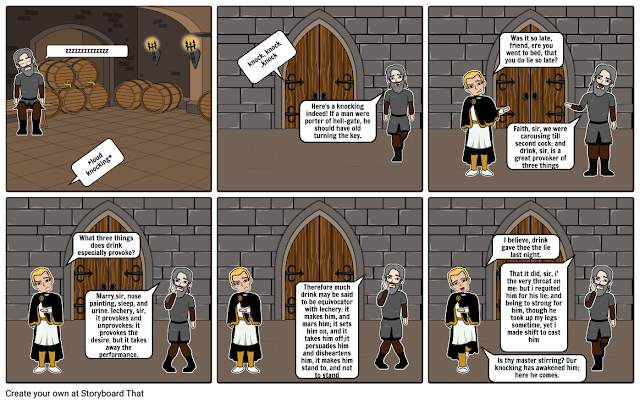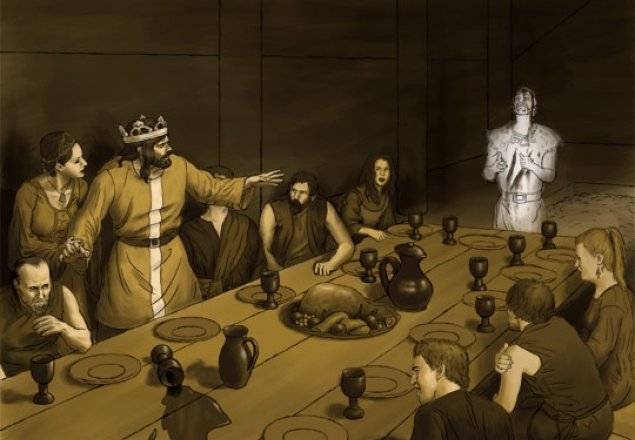Dramatic Significance of the Porter Scene in Macbeth
Few scenes in Shakespeare can provoke more laughter in the theatre than the ‘Porter Scene’ in Macbeth (II, iii). At the centre of this paradox lies the character of the Porter, and in particular the obscenities which punctuate his remarks. Some critics like Pope, Coleridge, Clark and Wright consider this scene to be an interpolation yet the dramatic importance of this scene cannot be denied.
The Porter Scene provides the much-needed dramatic relief in Macbeth. It follows the breath-taking and awe-inspiring murder scene of Duncan’s murder which marks the crisis of the play. Though the murder takes play off stage the horror of the deed is effectively brought to the audience by a succession of tension bound scenes the appearance of the witches, the report of Macdonald’s execution, the instigations of Lady Macbeth to her husband and the appearance of the bloody dagger and Macbeth’s intense soliloquies. So, without the relaxation afforded by the comically sententious Porter, the audience who have just witnessed the mental agony of the preparations for Duncan’s murder and Macbeth’s frenzied reaction would feel jaded by the horror which the discovery of the murder evokes.
One of the best examples of the introduction of the jolly Porter who keeps the important nobles outside in the storm till his jest is comfortably finished, making each furious knock fit into the elaborate concept of Hell-gate. This tone of broad farce, with nothing else like it in the whole play, comes as a single ray of common daylight to separate the agony of the dark night’s murder from the agony of the struggle of concealment’.
Thus, it can be said that the ‘Porter Episode’ adds variety to the action of the play by providing emotional relief to the spectators. It also, by way of contrast, adds to the intensity of impression of events before and after it. Some critics like Muir opined that instead of providing comic-relief to the audience it increases the audience’s feelings of horror.
The ‘Porter Episode’ is a necessity for the stage. To examine the Porter's theatrical necessity and effectiveness, it might be better to start off with Capell's comment on the scene. The first point Capell remarked is rather matter-of-fact, but strong, ‘without this scene Macbeth's dress cannot be shifted nor his hands washed’. The arrival of the Porter follows immediately after the murder of Duncan, so something must be inserted here to delay the discovery of the deed to buy time for changing clothes. Secondly, Capell pointed out that the scene functions to give ‘a rational space for the discharge of these actions’. Macbeth is short and relentless play rushing to the tragic ending at a breathless speed, but appropriate space between two horrific scenes - the murder and the discovery of it - may work effectively to heighten the tension and produce an image of horror.
The words of the drunken Porter are charged with dramatic irony. He compares himself with the Porter of Hell gate without knowing that the castle of Macbeth has now been turned into a Hell due to the ghastly assassination of Duncan. In Macbeth, the Porter’s first question is,
‘Who’s there, i’th’ name of Belzebub’’ (L 4)
He should have said ‘in the name of my master’ or possibly ‘in the name of Macbeth’. Unknowingly he compares Macbeth with Belzebub and Macbeth has now, indeed, become a devil after murdering Duncan. The Porter’s remarks on equivocation are also ironical.
The three professions which the Porter has said about, has topical allusion. The images are all well knitted in the theme of the play. The commentary by Hunter suggested that the Porter’s word-play ‘based on the tradition of ‘Estates-Satire’, in which ‘some of all professions’ were surveyed and condemned’. Plus, Harcourt’s remarked that ‘the Porter's three examples were chosen, not at random, but precisely because of their relevance to the dramatic situation’.
Among those three, the equivocator, the second one, may be the most important figure in terms of dramatic image. The reason why the equivocator is so important is that it can be understood as a
reference to Father Garnet, the principal culprit of the Gunpowder plot of 1605. The reference to the Gunpowder plot is not only useful as a main resource to decide the date of the text, but also dramatically relevant because it might work upon audience's mind with strongly suggestive images. For the audience in Shakespeare's time, the Gunpowder plot was contemporary event which definitely remained in their memory. Father Garnet, after equivocating so much in the trial, was hanged as plotter of regicide. Equivocation, hanging and regicide - these three words can directly apply to Macbeth with great exactness and equivocation is also a major theme in the play.
reference to Father Garnet, the principal culprit of the Gunpowder plot of 1605. The reference to the Gunpowder plot is not only useful as a main resource to decide the date of the text, but also dramatically relevant because it might work upon audience's mind with strongly suggestive images. For the audience in Shakespeare's time, the Gunpowder plot was contemporary event which definitely remained in their memory. Father Garnet, after equivocating so much in the trial, was hanged as plotter of regicide. Equivocation, hanging and regicide - these three words can directly apply to Macbeth with great exactness and equivocation is also a major theme in the play.
The other two professions, farmer and tailor, are less significant, but still have considerable meaning. According to Wills, the farmer ‘has been often connected with Henry Garnet because his widely publicized indictment included Farmer among his pseudonym’. Added to this, this can be taken as a reference to the steep drop of price in England around 1605. About the tailor, his thieving might imply the parallel to Macbeth's usurp, ‘throne-thief’, and some sexual connotations in it are pointed out by Rosenberg interestingly. The tailor also has his place in the scheme of the play, because of the clothing imagery which is so abundant in Macbeth.
The Porter’s words on lechery are written in a series of antitheses: provokes’unprovokes; provokes’takes away; desire’performance; makes’mars; sets on’takes off; persuades’disheartens; stand to’not stand to. Thus the ‘Porter episode’ is a heightened personification of the antithesis of the entire play, for the play is constantly developing in contrasting entities.
Thus, the Porter scene has wide range of functions from buying time for changing clothes to comic-relief to allusion to mystery plays to the major themes of the play, but there is no need to discuss the necessity of the scene if we once hear the sound of knocking and see obscure figure staggering from darkness in actual performance. It comes immediately after the murder scene in which all of us - including Macbeth and his wife - are afraid of the revelation of the crime, and the tension filling auditorium is at its height, and suddenly comes the knocking. Theatrically, the effect of this sound is immense. The knocking comes at the time when heart beats are increased and the stage is filled with hashed silence. In this situation, it is extremely difficult to invent a sort of bridge-character not violating its diabolic mood and integrity of the play. Shakespeare had done it. In terms of style and content, better character than the Porter cannot be thought of, and thus it is impossible to regard this scene as being interpolated. On the contrary, this scene is one of the finest examples to verify Shakespeare's genius as dramatist.




Well written and very helpful for new blogger
ReplyDelete